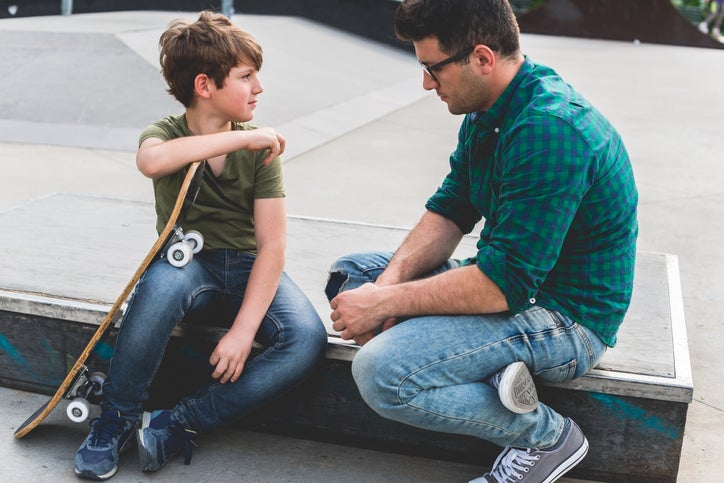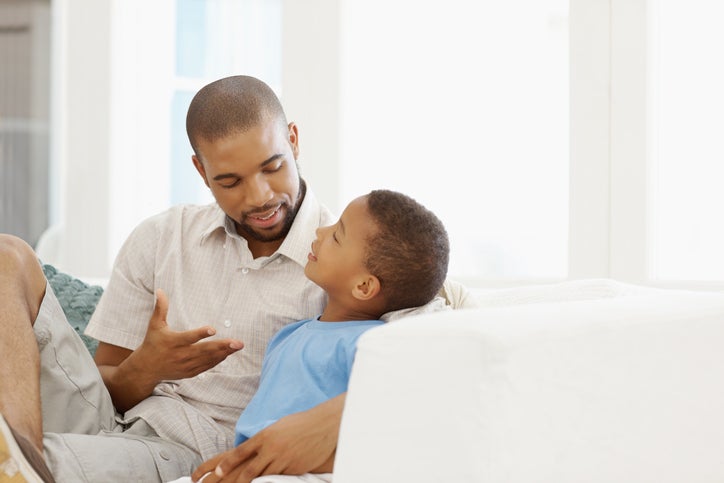-
Why you Should Let your Children have Pets

There’s something appealing about seeing kids and pets together. Especially if you’re an animal lover, the very idea of bringing a pet into your child’s life can conjure up idealistic images of kids playing, snuggling, and bonding with a new animal friend. But is it a good idea? There are many factors to consider, but there are plenty of great reasons to let your children have pets.
Before looking at the positives of pet ownership, let’s address the negatives. Pets are a big responsibility, and much of that responsibility falls on the parents. Having a pet requires a significant investment of time and money. Cats and dogs live for many years, so they require a commitment to an essentially permanent family member. Smaller pets, like goldfish and hamsters, don’t live as long, but their shorter lifespans present an emotional challenge. Pets require food, exercise, grooming, and veterinary care. Additionally, if a family member turns out to be allergic, you’re likely to have to experience the pain of rehoming a pet just as you’ve gotten attached.
Now that the negative aspects of pet ownership are out of the way, let’s look at all the wonderful things about getting a pet for your child.
- Pets can be good for a person’s health. In fact, research indicates that children who grow up with pets are at a lower risk of developing allergies and asthma. Pet owners require fewer trips to the doctor, and playing with dogs can lower blood pressure.
- Having a pet encourages exercise. Running, walking, playing, throwing a ball: pets give kids great reasons to head outside and get moving.
- Pets provide emotional benefits. Pets reduce stress, loneliness, and anxiety, and children with pets tend to have better impulse control, social skills, and self-esteem. Living with animals gives kids a healthy respect for nature, and children derive comfort from having an animal pal.
- Children learn while playing with pets. Caring for pets fosters responsibility, and nurturing a pet helps kids practice caregiving, developing empathy and compassion. Additionally, kids who are learning to read benefit from reading aloud to pets. Some studies even indicate that having pets helps kids become comfortable in leadership roles.
- Pets help a family to bond. Pets give families a common interest and can help slow the hectic pace of modern life. There’s even evidence to show caring for a pet together increases the sibling bond.
Pets are a great idea for a family with kids, as long as you make sure the pet you’re getting is a good fit for your family. When you’re ready to start a family, the Center for Vasectomy Reversal is here to help. Under the direction of Dr. Joshua Green, our team provides state-of-the-art treatment for men who need a reversal of their vasectomy or help with their fertility. To learn more, contact us through our website, or call 941-894-6428 to arrange a free consultation.
-
How to Discipline your Children

Being a parent is a hard job, especially because it’s your responsibility to teach your children how to be good people. Teaching your kids how to behave properly can be a challenge when there is so much conflicting information about discipline. Remember: discipline should be about guiding and teaching your children, not getting angry and punishing them. Here, we offer some tips for disciplining your children successfully.
- Set clear limits and firm consequences. Your rules should be clear and consistent, and the consequences should be established ahead of time. When a rule is broken, be prepared to follow through right away.
- Be positive whenever possible. Catch your children doing the right thing so that you can give positive attention and praise their successes. Even when you’re setting limits, try to phrase things in a positive way, telling them what they can do instead of just saying no.
- Take the time to listen. Especially with older kids, it’s important to hear your child’s point of view. When a child feels heard, he or she will be more likely to listen.
- Model the behavior you want to see. Stay calm when you’re correcting your child, both in your words and actions, and you’ll set a better tone for your household.
- Let some things go. If you’re always saying no, your child will begin to tune you out. On the other hand, sometimes ignored misbehavior delivers its own natural consequences. Prioritize, to avoid nagging.
- Avoid physical punishment. Spanking is a hotly debated topic, but most experts agree that it’s not a good idea. Research indicates that physical punishment is ineffective and causes long-lasting negative effects.
- Watch your words. Verbal abuse can be as painful as physical punishment, causing the same kind of long-term damage. Make sure the words you say to your children focus on building them up, rather than tearing them down.
- Set your child up for success. Pay attention to patterns in a child’s misbehavior and try to avoid situations that will stretch a child’s limits. Children who are hungry, tired, or overexcited are more likely to misbehave.
- Keep discipline age appropriate. Begin setting limits when your child is still an infant, and once he or she is a toddler, start using short time-outs and redirection to correct misbehavior. Preschool children are old enough for simple chores, and to begin learning about good choices and logical consequences. Older children need a balance of privilege and responsibility, and teens need clear boundaries and the opportunity to build decision-making skills.
Being a parent requires commitment and hard work, but it’s also extremely rewarding. If you’re ready to start a family, the Center for Vasectomy Reversal is here to help. Under the direction of Dr. Joshua Green, our team provides state-of-the-art treatment for men who need a reversal of their vasectomy or help with their fertility. To learn more, contact us through our website, or call 941-894-6428 to arrange a free consultation.
-
Common Questions Kids Ask and How to Answer Them

If there’s one thing kids know how to do, it’s ask questions. Unfortunately, sometimes the questions they ask come at inopportune times, and we as parents may not have ready answers. Heard any hard questions lately? We’ve compiled some tips on how to answer your child’s questions, as well as a list of questions you might hear.
When a child asks as questions, mirror the question back at the child; sometimes children are seeking validation for their feelings rather than concrete answers. Once you’ve mirrored what you believe is being asked, let the child ask a second time, to clarify the question. When answer, keep your answer age-appropriate and don’t the child more information than he or she can handle. Now, let’s look at some common questions.
- Why is the sky blue? Science questions are fun! The sky looks blue because that’s the color of the light in the air. When it’s time for sunrise or sunset, the molecules in the air spread out, and then the sky looks red or orange.
- What happened to the dinosaurs? Talking about dinosaurs can open up much bigger scientific conversations. The simple answer: an asteroid crashed into the earth when dinosaurs were alive, and it changed the planet. Dinosaurs died because they couldn’t adapt to the changes, and new animals that could live in the changed climate took their place.
- Where do babies come from? Before answering this question, take a breath. Make sure you know exactly what your child is asking, so you don’t give too much information when it’s inappropriate. Keep your answer simple and age-appropriate, but avoid confusion by using the correct terminology.
- Why do people speak different languages? This provides an opportunity to discuss other cultures and how we can learn from them. The short answer: a long time ago, people in different parts of the world invented different words for things, and languages grew from there.
- Why do we cover our private parts? Be matter of fact about this, explaining that it’s because we use those parts for things we don’t do in public. Talk about which body parts are off-limits to outsiders, while modeling a calm attitude about the body.
- Why do people get sick? Give a simple explanation, being careful to differentiate between common and more serious illnesses. Use the opportunity to discuss habits that help keep people healthy.
- What happens when people die? This answer will vary based on your beliefs, but remember, it’s ok to say you don’t know.
Having kids is sometimes a challenge, but it’s always a gift. If you’re ready to start your family, the Center for Vasectomy Reversal is here to help. Under the direction of Dr. Joshua Green, our team provides state-of-the-art treatment for men who need a reversal of their vasectomy or help with their fertility. To learn more, contact us through our website, or call 941-894-6428 to arrange a free consultation.
-
How to Teach your Children About Safety

Once you have kids, the world can seem like a frightening place. It’s easy to think of all the bad things that could happen to your vulnerable children, you want to protect them. At the same time, you don’t want your children to be fearful people, but rather friendly and openhearted. How do you teach your children to protect themselves from dangerous people without robbing them of innocent, joyous interactions with people in the world around them?
- Be aware that “stranger danger” is an oversimplified concept. Most child abduction and sexual abuse cases are committed by people who are not strangers to the children. Try teaching your children about suspicious behaviors, and consider using the term “tricky people” instead of “strangers”. Explain that while most people are good, some people try to trick children into breaking safety rules.
- Talk about safe strangers. Teachers, firefighters, and librarians are all examples of strangers that kids can go to for help. Teach your kids to seek help in a public place if something happens, and point out safe places to ask for help, like local stores and restaurants, or friends’ houses.
- Institute clear rules instead of overreaching guidelines. “Never talk to strangers” is not great advice, because you want your child to reply to the well-meaning grandmother in the grocery store or the librarian trying to help find a book. Try coming up with specific rules instead, like these examples:
- Don’t get in a car with anyone you don’t know.
- Don’t accept candy or food from strangers.
- Don’t go into anyone’s house without permission from a parent.
- Don’t listen to someone who wants you to disobey your parents.
- Don’t keep secrets from your mom and dad.
- Don’t do anything that makes you feel bad or uncomfortable.
- Get a trusted adult if someone you don’t know asks you for help.
- Teach your kids to trust their instincts. If something makes a child feel uncomfortable, he or she needs to know that it’s ok to say no. Teach the concept of consent, and role-play scenarios in which your children have to stand up for themselves.
- Encourage your kids to be assertive. Teaching kids “No, Go, Yell, Tell” is a good way to help them remember what to do in a dangerous situation. They should say no, run away, yell loudly, and tell a trusted adult. Practice this at home, so your child is ready in the event of an emergency.
Keeping kids safe is a big responsibility, but you’re up to the challenge. If you’re ready to start a family, the Center for Vasectomy Reversal is here to help. Under the direction of Dr. Joshua Green, our team provides state-of-the-art treatment for men who need a reversal of their vasectomy or help with their fertility. To learn more, contact us through our website, or call 941-894-6428 to arrange a free consultation.
Recent Posts
Popular Posts
categories
- Uncategorized
- Sperm Retrieval
- vasectomy reversal
- Emergency
- Dr. Green
- sperm count
- fertility
- male infertility
- MESA
- medical care
- low sperm count
- IVF
- male fertility testing
- anesthesia
- pregnancy
- sperm aspiration
- semen analysis
- post-vasectomy pain syndrome
- infertility
- VE
- anti-sperm antibodies
- older dad
- general anesthesia
- gender reveal party
- post-operative infections
- baby name
- parent
- baby's first year
- fertilization process
- spinal anesthesia
- ACS Fellow
- nutrition tips
- concierge-level care
- fertility planning app
- azoospermia
- out-of-town patients
- V-V
- post-vasectomy reversal
- conceiving
- vasectomy
- vasoepididymostomy
- smoking
- sperm quality
- baby registry
- infographic
- surgical care
- surgical consultation process
- prostate cancer
- baby gender
- family time
- COVID
- Baby Shower
- Child Care
- Halloween Costume Ideas for Babies
- Halloween
- Halloween Safety Tips
- Celebrity Infertility Spotlight
- Postpartum
- testosterone
- Father's Day
- Father
- Men's Health
- Thanksgiving
- Pregnancy Announcement
- Parenting Tips
- Sperm
